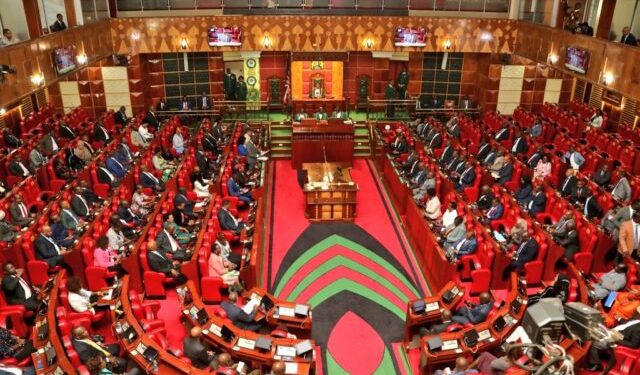The National Assembly of Kenya reconvenes today, resuming its legislative duties following a lengthy recess. Lawmakers are poised to deliberate on a robust agenda, which includes the nomination of a new Inspector-General for the National Police Service, critical legislative proposals, and budgetary adjustments as part of the Division of Revenue Amendment Bill 2024.
At the forefront of today’s session is the vetting of Mr. Douglas Kanja, the nominee for the position of Inspector-General of the National Police Service. The nomination has already been reviewed by a Joint Parliamentary Committee, which includes the National Assembly’s Departmental Committee on Administration and Internal Affairs and the Senate’s Standing Committee on National Security, Defence, and Foreign Relations. The joint committee’s findings will be tabled for debate, with the final decision expected to shape the future leadership of Kenya’s police service.
The House will also consider another vital nomination—that of the Director-General of the Competition Authority, who will oversee the regulation of fair trade practices within the country. The vetting reports for both key positions will be subjected to parliamentary scrutiny in what is expected to be a decisive day for national security and economic governance.
Parliament’s agenda further includes the second reading of significant bills, among them the Coffee Bill (2023), which aims to regulate Kenya’s coffee industry, ensuring fair trade practices and promoting sustainable development. With coffee being a vital export crop for Kenya, the bill is seen as essential in supporting local farmers and addressing systemic issues that have plagued the sector for years. Legislators are expected to weigh in on how best to strike a balance between producer interests and market realities.
The Equalization Fund (Administration) Bill (2023) is also set for discussion, which seeks to streamline the administration of the Equalization Fund. This fund, designed to address regional disparities in development, has been a contentious issue, particularly for marginalized counties. Lawmakers will consider how these funds are managed to ensure they achieve their intended purpose of reducing inequalities in infrastructure and services.
Another key bill on the table is the Mung Beans Bill (2022), a proposed law that seeks to regulate and promote the mung beans industry. This crop has gained importance due to its potential to boost food security and economic opportunities in arid regions.
One of the most closely watched pieces of legislation will be the Division of Revenue (Amendment) Bill (2024), which aims to address revenue-sharing between the national government and counties. The bill has been necessitated by a shortfall in projected revenues for the 2024/2025 financial year. The Senate referred the bill to the National Assembly following Treasury Cabinet Secretary John Mbadi’s presentation of the revised revenue allocations before the Senate Committee on Finance and Budget. The bill’s passage is expected to have far-reaching effects on county governments’ fiscal capabilities.
Alongside these critical bills, the House will also consider the County Government Additional Allocations Bill (2024), designed to facilitate the transfer of both conditional and unconditional allocations from the national government and development partners to counties for the fiscal year 2024/2025.
Several other bills that have undergone mediation, including the National Rating Bill (2023), Sugar Bill (2022), and Cotton Industry Development Bill (2023), are scheduled for further debate. These bills seek to address regulatory frameworks in various sectors, with lawmakers expected to push for clarity on their implementation.
Also on the docket are individual members’ bills, such as the Public Service Internship Bill (2022) by Hon. Naisula Lesuuda, and the Public Service (Values and Principles) (Amendment) Bill (2022) by Hon. Abdul Rahim Dawood.
In addition to legislative matters, Cabinet Secretary for Education Julius Ogamba will face questioning tomorrow on the new university funding model.


















